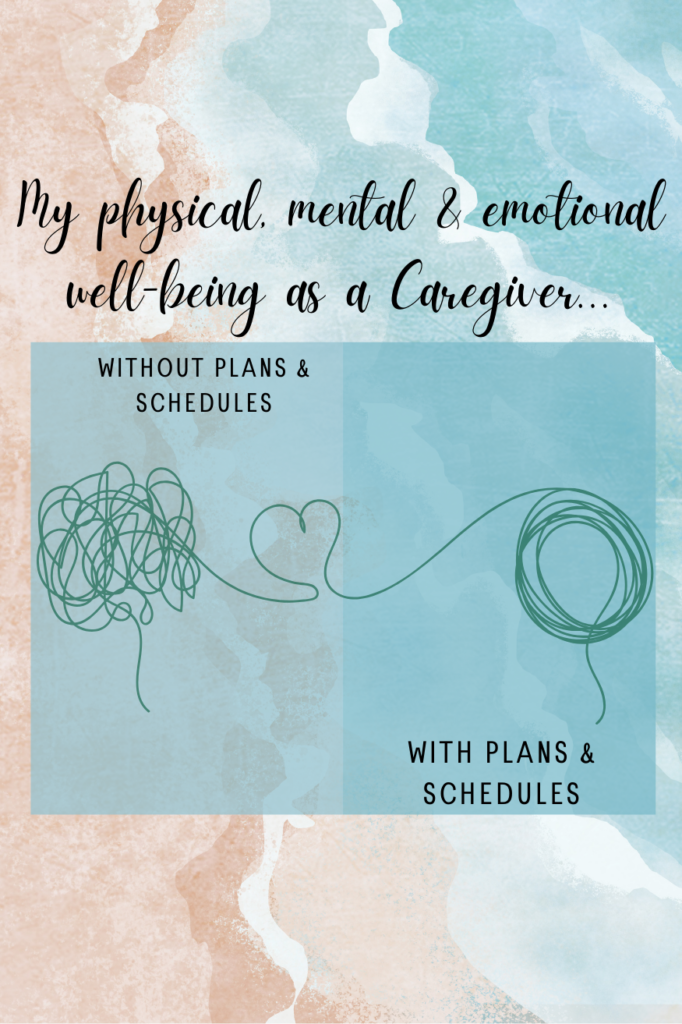Whether you’re caring for elderly family members, dependent children, or both, caregiving is a demanding job.
It is taxing on our physical beings, our mental capacity, and our emotions.
When caregiving is imbalanced with other life responsibilities and our personal life, we become overwhelmed and burdened. This is when stress, anxiety, and other health conditions develop. As a result, our overall well-being and ability to cope with every day life are affected.
Even the smallest inconvenience can set us off as we carry the weight of the world on our shoulders. These moments can make us snap or cry, and mess with our ability to think straight.

Time management for caregivers is, therefore, important to help us stay sane, resilient, and both comfortable and happy to continue taking on life.
I saw this motivational quote, which chimes well with my life sentiments and approach. Not least for managing all the different life responsibilities I’ve had over the years with a plan and a schedule!
Either you run the day, or the day runs you.
Jim rohn
I’ve also seen other motivational quotes championing the idea of self-management rather than time-management. Looking back at my 8-years of caregiving, I would agree. However, I would add to this by saying self-management is a process and easier said than done.
How to start organising time as a caregiver?
Before we start planning, scheduling, and organising our time, we need to recognise and agree with the idea that it is about self-management, and not time-management.
We need to believe that we, as an individual, must be truly disciplined in organising and managing our own responsibilities and duties. That we can only take on our top priorities, and that it is okay to say no without feeling guilty about it.
Organising time as a caregiver – step 1
To begin planning, I suggest sitting down somewhere quiet, somewhere you won’t get disturbed or distracted.
The task is to think big (holistically), dig deep and lay your cards on the table. So a morning or afternoon by yourself, perhaps in a coffee shop, wouldn’t be a bad idea.
Grab a note pad, a drink, and start identifying all the priorities you take on in life and must give time to.
At this point, you don’t need to prioritise or cut anything out. Just have a brainstorm, think of all the things you do, must do, need to get around to doing etc. and write them down on a clean sheet of paper.
These are all the ‘whats’ and once you have these all on paper, you can begin to move onto task two.
Perhaps grab a fresh drink or stretch your legs at this point to take a breather.
Organising time as a caregiver – step 2
Step 2 is to create three columns on a fresh piece of paper and title them:
- Top priority – do urgently
- Secondary – deal with later or delegate
- Delete

Now, refer to your first sheet of paper, look over the ‘whats’ you’ve written down and start moving each into one of the three columns.
I would start with column 1, your top priorities, and be strict with yourself and disciplined. Not everything can go into column 1!
Easier said than done, I know, so here are some of my examples which I hope are a useful reference point.
- Top priority – do urgently: delete social media apps from mobile phone; speak to work about possible work adjustments; take Dad to chemotherapy and radiotherapy appointments; book personal asthma review with doctor; take Mum to disability benefits assessment; grocery shopping for parents; cook dinner for parents.
- Secondary – deal with later or delegate: develop caregiving schedule for Mum and Dad with healthcare professionals, medical staff, and sisters; re-order colostomy bags and stoma equipment; arrange care for Dad while I’m taking Mum to disability benefits assessment; plan & book breaks away with husband; book yoga fitness retreat with the girls; book Mum’s diabetes review with doc and annual eye test.
- Delete: forgo social and digital media for a period to embrace JOMO (joys of missing out); reduce responsibilities and time at work to free up family time; skip some social events, gatherings, and dinners with friends to free up family time or time for myself; be less rigid with my routine and be kinder to myself (i.e. it is okay to leave some dirty dishes in the sink for the morning!).
Organising time as a caregiver – step 3
Once we have our three lists, we can begin to create a schedule. A plan for ‘when’ we will take on and action our priorities and ‘when’ priorities have to be accomplished.
However, before we start, do a stock take and ask yourself the following questions.
Do my three lists look balanced? If not, you need to re-balance them by moving some tasks into another list.
Do I feature in either list 1 or 2? Have I identified priorities for my needs? If not, you need to add something, even if just for 1-hour a day for yourself so you can do something just for you.
The easiest way to create a schedule, while giving the highest importance to your most crucial/urgent tasks, is to start with column 1.
- Open your digital or paper calendar and begin to schedule tasks, appointments, and reminders from column 1 into your diary.
- Add every task, from time-sensitive ones and one-off / adhoc tasks to regular/repeat appointments. Everything must go in before you move onto the tasks in columns 2 and 3.
- Be as clear as possible by including detailed descriptions, names of people, and specifying the exact day(s) and time(s). Flag whether the appointment is a task, a meeting, a phone call, or a reminder.
- Review your lists and diary appointments regularly. Some things may be easier to check and update on a daily basis, while others will be adhoc or better at regular intervals. On average, I like to check in weekly to keep things in order. I find this helps to improve my mental health as well! My recommendation is to do this on a Friday before the weekend or a Sunday before the start of the following week.
Broadly speaking, getting organised in this way can be applied to many life responsibilities that we have.
Looking back, I have planned and scheduled almost everything! Granted, I’ve used different formats, templates, and tools (e.g. digital and paper diaries, Excel spreadsheets, Word, and mobile apps). But I have planned and created schedules for:
- Budgeting in order to save money
- Our wedding abroad
- Dad’s cancer treatment and medications
- Caring for Mum and Dad
- Managing gestational diabetes
- Our Son as soon as he was born until about 1-year old
- Travelling and packing to manage our Son’s multiple food allergies and skin condition
If you’d like some support to plan and schedule your own priorities, please drop me a message. I would love to chat and help by sharing what works for me.

Other tips for self-management and organising time as a caregiver
Identify what causes you stress – be honest and ask what causes you stress and worry. Perhaps it’s your work or study environment. Or that your work-life balance has become unbalanced. Or, you need more childcare support. Write down all the things that stress you out and list them in order of priority – which challenges are the most important and need to be dealt with first?
List down solutions for each of your challenges –
- Can you talk to work to explore options for streamlining your workload? Can adjustments be made?
- Are there tasks, responsibilities, projects that you can delegate to someone else?
- Where can you get additional support? (family, trusted friends, work HR, employee support, medical and/or naturopathic professionals, life coaches etc.)
- Can you access (more) childcare support/benefits and enlist the help of a babysitter/childminder to help with childcare?
- Is it possible to reschedule non-urgent commitments until you have created more space in your day? (based on the planning and scheduling exercise detailed above, the answer should be yes!)
- What support networks can you put in place to create a better work-life balance?
Start making changes immediately – Start with the smaller issues as they may be easier and quicker to resolve, before tackling more complex problems which may take more time, energy and resources. Create boundaries and set realistic expectations – you need to take control back to create the life balance you desire.
Learn how to say ‘no’ without feeling guilty – saying no does not make you a bad or unhelpful person. You simply don’t have capacity and time to take on everything, and some things must be prioritised first. What you can do is hold-off and reschedule non-urgent commitments until you have created more space in your schedule. This may be a couple of days, weeks, or months later, but if you communicate and explain your situation, the reasonable person will understand and may even support you (by retracting the request and taking it off your plate). More about this from Carers UK.
Use smart apps and combine tasks when possible – for example, use online shopping apps and add items on-the-go as and when you see that something’s running low. Combine calendar reminders for similar tasks like requesting repeat prescriptions from the GP. Or, combine appointments and tasks in your diary like listing out what needs to be picked up and bought when you’re next at the pharmacy.
Ask for help when you need it – people you love and trust like family and close friends will jump at the chance of helping and supporting you if you open up. But people at work, like HR colleagues and employee support, will also be there for you. Another idea is to seek support from medical and/or naturopathic professionals and life coaches. As Caregivers, it is more than okay to ask for help when we need it.

Remember to love yourself – taking time out for yourself must be crucial and fundamental in your schedule. I recommend putting aside 1-hour a day to focus just on you. You could:
- Start by having a digital detox. Limiting screen time especially from social media is exactly what I did when I experienced my first burn-out / breakdown.
- Turn off the news and don’t engage in negative media narratives. Again, something I did by deleting news apps from my phone.
- Take regular walks outside in nature. This was particularly important to me during the pandemic and lockdown, not least because I was pregnant in 2020 and on maternity leave in 2021.
- Get plenty of sleep. Do your best to go to bed early and adopt a healthy sleep routine. (Easier said than done, I know!)
Eat a nourishing diet that is rich in key nutrients. Try cutting down on caffeine and avoiding foods that deplete your body. Boost intake of vitamins and minerals. Read about this and get further tips here:
- How to manage high-risk pregnancy: low PAPP-A & gestational diabetes
- How to manage baby & toddler food allergies, eczema & asthma
- Summer health tips & superfoods to boost energy
- Why a plant based diet is great for the body and allergy sufferers?
- What things make eczema, asthma, and body inflammation worse?

Through self-management, using plans and schedules, and by following some of these tips, I hope caregiving becomes more balanced for you with other life responsibilities.
I hope any stress, anxiety, and other health conditions you may have been experiencing as a result of running an imbalanced schedule are alleviated .
As a result, I hope with some self-management and organised time your well-being and ability to cope with every day life improves.
For further support, please do not hesitate to drop me a line. I’d love to chat.



